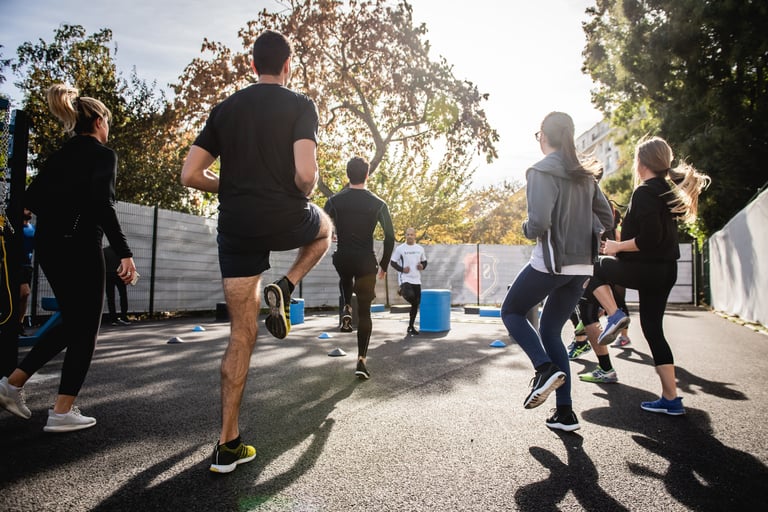Physical Health And Fitness
It’s no secret that physical health and fitness have become increasingly important in the modern world. With so much of our lives spent at work, sitting in front of a computer screen, or glued to a smartphone, many of us are missing out on the simple things that keep us healthy and fit. That’s why it’s so important to prioritize physical health and fitness as part of our daily routine. In this blog post, we will explore some of the ways to make sure you stay physically active and healthy in today’s modern world. From exercising regularly to watching your diet and more, these tips can help you get back on track with your own physical health and fitness goals.
Physical Health
Regular physical activity is associated with a host of benefits for both the body and the mind. In terms of physical health, exercise can help to reduce the risk of developing chronic conditions such as heart disease, stroke, type 2 diabetes, and cancer. It can also help to keep weight in check, improve joint function, and increase bone density. And that's just the tip of the iceberg!
In addition to its physical benefits, exercise has also been shown to be beneficial for mental health. It can help to reduce stress and anxiety, improve mood, and promote cognitive function. Exercise has even been shown to be protective against age-related cognitive decline. So, if you're looking for ways to boost your physical and mental health, regular exercise is a great place to start!
Aspects of physical health
There are many aspects of physical health that contribute to overall fitness and well-being. These include proper nutrition, adequate sleep, regular exercise, and maintaining a healthy weight.
Nutrition is essential for good physical health. The body needs a variety of nutrients to function properly. These include vitamins, minerals, proteins, carbohydrates, and fats. Eating a balanced diet that includes all the major food groups is the best way to get the nutrients you need.
Sleep is also important for physical health. Most people need around eight hours of sleep each night. Getting enough sleep helps the body repair itself and lowers stress levels.
Exercise is another important part of physical fitness. It helps to build strong muscles and bones, improve heart health, and control weight. A combination of aerobic exercise and strength training is best for overall fitness.
Maintaining a healthy weight is also important for physical fitness. Being overweight or obese can lead to a number of health problems including heart disease, diabetes, and joint pain.
Determinants of physical health
There are numerous determinants of physical health, including but not limited to: diet, exercise, sleep, stress management, genetics, and doctor/healthcare provider care. Each of these factors play a vital role in one's overall physical health and fitness. Diet is perhaps the most important determinant of physical health.
What we eat directly impacts our energy levels, weight, mood, and overall well-being. Eating a nutritious diet rich in fruits, vegetables, lean protein, and healthy fats provides the body with the fuel it needs to function optimally. Conversely, a diet high in processed foods, sugar, and saturated fat can lead to weight gain, low energy levels, and poor overall health.
Exercise is another critical determinant of physical health. Just like diet, regular exercise has countless benefits for our physical wellbeing. Exercise helps to improve cardiovascular health, increase muscle strength and endurance, promote weight loss/management, reduce stress levels, and more. For optimal health benefits, aim for at least 30 minutes of moderate-intensity exercise most days of the week.
Sleep is often underestimated as a determinant of physical health but it is actually essential for recovery and repair after exercise (and everyday life). When we sleep our bodies are able to rebuild damaged tissue and cells, regulate hormone levels ,and restore energy stores. Lack of sleep can lead to weight gain ,moodiness ,and decreased performance both mentally and physically. Most adults need 7-9 hours of sleep.
Measuring physical health
When it comes to measuring physical health and fitness, there are a few key indicators that experts look at. Here are some of the most important things to keep in mind when tracking your physical health:
1. Body weight and composition: Your weight is a good general indicator of your overall health, but it’s not the only thing to consider. Body composition, or the ratio of fat to muscle mass in your body, is also an important metric. A healthy body composition is usually around 20-30% fat for men and 30-40% for women.
2. Cardiovascular health: This is typically measured by taking your pulse or blood pressure. A healthy heart rate is usually between 60 and 100 beats per minute (bpm), and a normal blood pressure reading is 120/80 mmHg. Higher numbers may indicate poor cardiovascular health and put you at risk for conditions like heart disease or stroke.
3. Strength and flexibility: These two factors are important for overall physical health and fitness. Strength can be measured by how much weight you can lift, while flexibility can be gauged by how far you can reach or bend without pain. Improving both strength and flexibility can help reduce your risk of injuries in the future.
4. Endurance: This refers to how long you can sustain physical activity without getting tired or winded. A good way to measure endurance is by doing a timed aerobic exercise, like running on a treadmill or riding a stationary bike etc.
Physical fitness
There are a lot of benefits to being physically fit. For one, it can help improve your overall health. Regular exercise can help reduce your risk of developing chronic diseases such as heart disease, stroke, and diabetes. It can also help improve your mental health by reducing stress and improving your mood. In addition, being physically fit can also help you maintain a healthy weight, which is important for reducing your risk of developing obesity and other health problems.
BMI (Body-mass Index)
Body-mass index (BMI) is a measure of body fat based on height and weight that applies to both adult men and women. BMI values are expressed in terms of kg/m2. A BMI value of 25–29.9 kg/m2 is considered overweight, while a value ≥ 30 kg/m2 is considered obese.
BMI is not a direct measure of body fat but rather a statistical estimate derived from an individual’s weight and height. However, BMI has been found to be a reliable indicator of body fatness for most people.
The average American adult male has a BMI of 28.7, while the average American adult female has a BMI of 26.5. These values are slightly higher than the international averages of 26.4 for men and 24.5 for women.
There are several limitations to the use of BMI as a measure of body fatness or health risk. For example, people who are very muscular often have BMIs in the “obese” range even though they have little body fat. In addition, elderly people and those with chronic illnesses may have lower-than-normal BMIs even though they are actually at an increased risk for health problems related to being underweight. Despite these limitations, BMI remains the most widely used method for assessing body fatness in population studies.
Standard Body Shape
There is no one "standard" body shape. However, there are some general trends that can be observed in terms of how people's bodies tend to look. For example, people tend to be taller and have less body fat as they get older. People also tend to gain weight as they get older, although this varies depending on lifestyle factors such as diet and exercise.
In terms of specific body shapes, women tend to store more fat around their hips and thighs, while men tend to store more fat around their stomachs. This is due to hormones and other biological factors. However, again, there is a lot of variation in how people's bodies look, and these general trends should not be used to judge or compare people's individual shapes.
Love Your Body
Working out and eating right are important for maintaining physical health and fitness, but it's also important to love your body. Accepting your body and treating it with respect is a key part of maintaining a healthy relationship with yourself. Here are a few tips for how to love your body:
-Accept your body as it is. It's okay to want to make changes, but don't beat yourself up for not being perfect. Your body is unique and beautiful just the way it is.
-Treat your body with respect. Eating healthy foods, getting enough exercise, and taking care of your skin and hair are all ways to show your body that you love it.
-Wear clothes that make you feel good about yourself. If you feel comfortable and confident in what you're wearing, it will show in your attitude and how you carry yourself.
-Don't compare yourself to others. Everyone is different, and we all have different bodies. Comparing yourself to others will only make you feel worse about yourself. -Focus on the things you like about yourself. We all have things we don't like about our bodies, but try to focus on the things you do like. Maybe you have great skin, or strong legs, or a pretty smile. Whatever it is, focus on those things and appreciate them!










